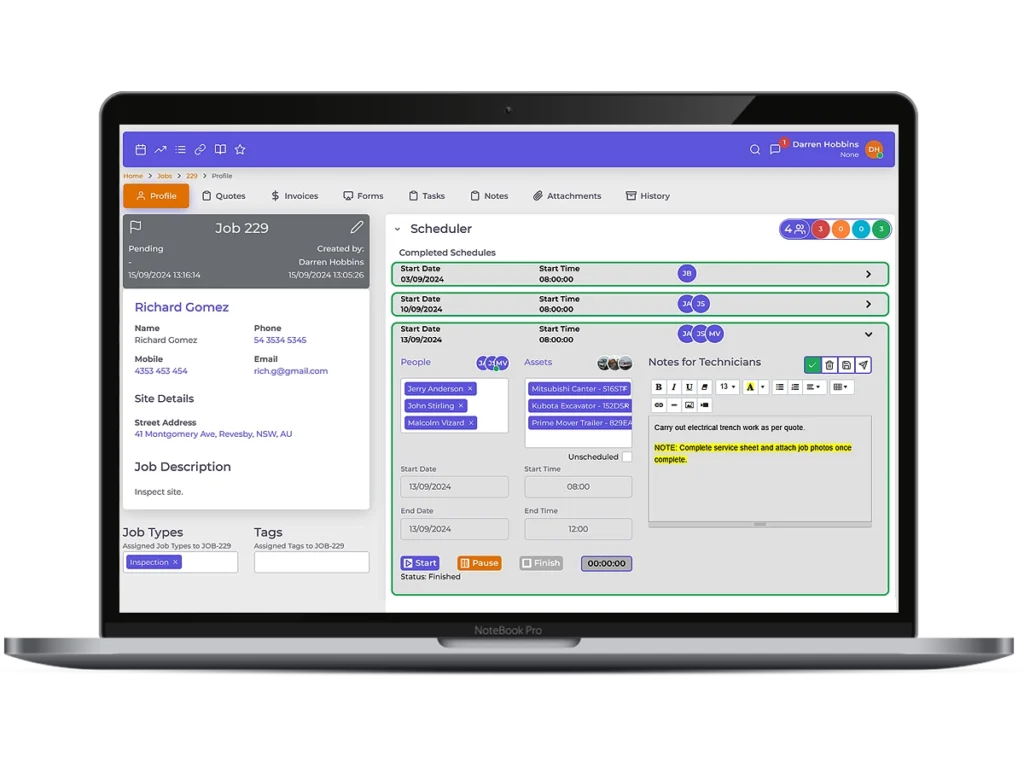Table of Contents
Job scheduling is a crucial process that helps businesses plan, organise, and assign tasks to their workforce efficiently. It involves allocating resources, setting deadlines, and ensuring that all tasks are completed on time. For businesses across various industries—whether service-based, construction, or IT—job scheduling ensures that operations run smoothly, avoiding unnecessary delays and bottlenecks.
Employee scheduling, particularly through software solutions, automates and streamlines the process of managing workforce schedules. It offers features like real-time updates, shift assignments, and conflict reduction, enhancing workforce efficiency, improving communication, and ensuring compliance with labor regulations.
With modern job scheduling tools, businesses can automate the assignment of tasks, track progress in real time, and adjust workloads based on changing priorities. Employee scheduling software plays a vital role in enhancing workforce efficiency and streamlining management processes by automating shift assignments, minimizing conflicts, and improving communication among team members. This ability to manage workflows effectively has become a game-changer in today’s fast-paced business environment.
Why Business Efficiency Matters
Efficiency is the backbone of a successful business. When workflows are streamlined for maximum efficiency, tasks are completed on time, and resources are used optimally, businesses see significant benefits in their bottom line. Proper job scheduling not only helps meet deadlines but also improves time management and boosts client satisfaction. Whether you’re a small startup or an enterprise-level organisation, business efficiency is the key to staying competitive.
1. Enhanced Time Management
One of the main benefits of job scheduling is its ability to reduce downtime. In a well-scheduled business, there’s minimal idle time between tasks, meaning resources—be they personnel, equipment, or materials—are used to their full potential. For example, in a busy service-based company, properly scheduled jobs ensure technicians are not waiting around between appointments, which improves overall efficiency.
Unlike manual scheduling processes that rely on paper or Excel-based systems and often lead to errors, miscommunications, and slowed operations, automated scheduling tools streamline the process, reduce labor costs, and enhance productivity.
When downtime is minimised, operational costs go down as well, helping businesses save on labour and equipment costs, while ensuring clients receive prompt service.
Real-Time Adjustments and Flexibility
Business is never static. Priorities shift, unforeseen events occur, and deadlines can change at a moment’s notice. Job scheduling tools provide the flexibility to adjust on the fly, keeping operations on track. With real-time updates, managers can reassign tasks, notify team members of changes, and adjust timelines without throwing the entire workflow into chaos. Additionally, the integration of time off requests enhances communication between management and staff, promoting employee autonomy and improving work-life balance.
This level of flexibility is critical in industries like construction or field services, where delays or changes can affect multiple projects simultaneously.
Meeting Deadlines Consistently
When work schedules are properly managed, businesses can consistently meet deadlines. This not only boosts efficiency but also helps build trust with clients, as they can rely on your business to deliver results on time. Using clear timelines and automated reminders ensures that everyone in the team stays on track and that no deadlines are missed.
For example, businesses that use job scheduling software often report significant improvements in their ability to meet delivery dates, leading to higher client satisfaction and repeat business.
2. Improving Workforce Productivity
One of the major advantages of job scheduling is its ability to allocate tasks based on staff availability and skill set. When managers know exactly who is available and which employee is best suited for each task, it becomes easier to optimise workloads. This ensures that the right people are doing the right jobs at the right time, reducing bottlenecks and ensuring that work is completed efficiently.
Traditional scheduling methods, which rely on manual processes, often fail to address the unique needs of a diverse and multigenerational workforce, leading to inefficiencies and challenges that modern technological solutions can mitigate.
For example, construction companies can assign workers to specific jobs based on their qualifications, ensuring a smooth workflow and high-quality outcomes.
Enhancing Employee Accountability
When job scheduling systems are in place, each employee knows exactly what is expected of them, making it easier to track job progress and completion rates. With clear visibility of each team member’s responsibilities, employees are more accountable for their work, leading to increased ownership of tasks and better performance.
This transparency also helps managers to assess individual productivity levels and make data-driven decisions on staff allocation or training needs.
Improving Team Collaboration through Employee Scheduling
Scheduling tools not only enhance individual performance but also improve overall team collaboration. When everyone is aware of their own tasks and how they fit into the larger project, there is less confusion and more alignment. Whether teams are working on-site or remotely, job scheduling keeps everyone on the same page.
In industries like IT services, where multiple departments often work together on complex projects, job scheduling fosters smoother communication and coordination.
3. Boosting Customer Satisfaction
A well-scheduled business ensures that service delivery is timely and consistent, which is crucial for client satisfaction. Customers appreciate knowing that their needs will be met on time, every time. By having a structured job scheduling system in place, businesses can offer predictable service, even during busy periods.
For example, field service companies that use job scheduling software can provide accurate service windows, ensuring customers aren’t left waiting, which leads to positive reviews and repeat business.
Improved Communication with Clients
Job scheduling tools often come with customer-facing features that improve transparency. Clients can track job progress, receive real-time updates on any changes, and even get notifications when a job is completed. This level of communication fosters trust and helps build long-term relationships with customers.
By giving clients peace of mind, you enhance their overall experience, which can be a key differentiator in a competitive market.
Minimising Scheduling Conflicts
Automated job scheduling reduces the risk of double bookings or under-servicing, both of which can negatively impact customer satisfaction. By ensuring that staff are available when needed and that resources are allocated efficiently, businesses avoid the headaches of overbooking or unfulfilled appointments.
Whether it’s a small plumbing business or a large-scale cleaning service, avoiding scheduling conflicts keeps clients happy and reduces complaints.
4. Cost Efficiency and Resource Management
Efficient scheduling plays a key role in reducing operational costs by minimising wasted labour hours, materials, and other resources. By assigning tasks more efficiently and ensuring that all team members are fully utilised, businesses can cut down on unnecessary expenses. For example, service businesses that schedule staff based on actual demand can significantly reduce overtime and save on labour costs.
Maximising Resource Utilisation
When scheduling is done correctly, all resources—whether human or material—are utilised to their full capacity. For industries such as construction or manufacturing, ensuring that equipment and personnel are used efficiently can have a significant impact on profitability.
For example, construction companies that schedule projects based on resource availability ensure that there is no downtime for expensive machinery, leading to better return on investment.
Improving Budget Management
Effective job scheduling allows businesses to forecast costs more accurately by ensuring that the right resources are allocated at the right time. This not only helps in managing day-to-day operational expenses but also in long-term financial planning. Companies that use job scheduling to predict workloads and resource needs often see improved budget control.
5. Leveraging Technology for Job Scheduling
The introduction of automation into job scheduling has revolutionised how businesses manage their workloads. Automated scheduling tools eliminate the need for manual task allocation, saving time and reducing the risk of errors. These tools can automatically assign tasks based on employee availability, skills, and deadlines.
Unlike manual scheduling processes, which often rely on paper or Excel-based systems and can lead to errors, miscommunications, and slowed operations, automated scheduling streamlines the entire process, reduces labor costs, and improves overall productivity.
Automation not only saves time but also helps businesses stay organised, especially during busy periods or when handling multiple projects at once.
Real-Time Tracking and Reporting
Job scheduling software provides real-time tracking, allowing businesses to monitor the status of ongoing tasks, track completion rates, and make data-driven decisions. This transparency is critical for managers who need to keep an eye on productivity, ensuring that tasks are progressing as planned and resources are being utilised effectively.
In industries such as logistics or field services, real-time job tracking enables businesses to stay agile, making adjustments as needed to avoid delays.
Mobile Job Scheduling Software Solutions
With the rise of mobile job scheduling apps, businesses can now manage their schedules from anywhere, at any time. This is especially useful for industries with remote or field-based teams. Mobile job scheduling apps allow staff to receive job updates, mark tasks as completed, and even communicate with clients or management while on the go.
For example, field service teams can use mobile apps to stay organised, reduce travel time, and respond to client requests more quickly.
Benefits of Scheduling Software

Automates the Scheduling Process, Reducing Manual Errors
Scheduling software revolutionizes the scheduling process by automating routine tasks, significantly reducing the risk of manual errors. This automation not only ensures that employees are allocated to the right tasks at the right time but also frees up valuable time for HR managers to focus on more strategic initiatives. By minimising scheduling conflicts, businesses can enhance operational efficiency and boost workforce productivity. Moreover, automated scheduling contributes to higher employee satisfaction, as it creates a more organised and predictable work environment.
Enhances Employee Satisfaction through Flexible Scheduling
One of the standout features of scheduling software is its ability to offer flexible scheduling options, which greatly enhances employee satisfaction. Employees can easily view their schedules, request time off, and swap shifts, all from a user-friendly interface. When employees have more control over their schedules, they are more likely to feel valued and engaged, resulting in reduced turnover rates and a more stable workforce.
Provides Real-Time Visibility and Control over Schedules
Scheduling software provides HR managers with real-time visibility and control over employee schedules, enabling them to make informed, data-driven decisions. This real-time insight allows managers to quickly identify and resolve scheduling conflicts, ensuring that the right employees are assigned to the right tasks at the right time. Enhanced visibility also leads to improved operational efficiency, as managers can adjust schedules on the fly to meet changing demands, reducing overtime costs and maximising workforce productivity.
Key Features of Effective Scheduling Software
Effective scheduling software should encompass several key features to ensure it meets the diverse needs of a business:
Automated Scheduling: By automating the scheduling process, businesses can reduce manual errors and free up time for more strategic tasks. This feature ensures that schedules are created efficiently and accurately, enhancing overall operational efficiency.
Real-Time Visibility: Real-time visibility into schedules allows HR managers to make data-driven decisions and optimize workforce efficiency. This feature is crucial for identifying and resolving scheduling conflicts promptly, ensuring smooth operations.
Flexible Scheduling: Providing flexible scheduling options enables employees to take ownership of their schedules, improving work-life balance and job satisfaction. This flexibility is key to maintaining high employee morale and reducing turnover rates.
Task Management: Integrating task management features allows HR managers to assign tasks and track progress in real-time. This ensures that all tasks are completed efficiently and that employees are held accountable for their responsibilities.
Employee Self-Service: Enabling employees to view their schedules, request time off, and swap shifts through a self-service portal leads to improved employee satisfaction and reduced administrative burden on HR managers.
Mobile Accessibility: Mobile accessibility allows employees to access their schedules and request time off on-the-go, providing convenience and flexibility. This feature is particularly beneficial for remote or field-based teams.
Reporting and Analytics: Reporting and analytics features provide HR managers with valuable insights into key metrics, enabling them to make data-driven decisions and continuously improve scheduling processes.
Integration with Existing Systems: Integrating scheduling software with existing systems, such as HR software and payroll systems, streamlines workforce management processes and ensures a seamless flow of information across the organization.
By incorporating these key features, scheduling software can significantly enhance business efficiency, improve employee satisfaction, and support effective workforce management.
6. Scalability and Future Growth
As businesses grow, their scheduling needs become more complex. Job scheduling tools provide the flexibility to scale operations, whether you’re adding new employees, expanding to new locations, or increasing service offerings. A good scheduling system can grow with your business, ensuring that efficiency is maintained no matter the size of your operation.
For instance, a small business that starts with a simple scheduling tool can upgrade to more advanced features as its operations expand, keeping workflows streamlined.
Preparing for Seasonal or Project-Based Workloads
Many businesses experience fluctuating workloads based on the time of year or specific project demands. Job scheduling helps businesses prepare for these shifts by allowing them to allocate resources in advance and avoid being understaffed or overbooked during peak seasons.
Retailers, for example, can use job scheduling software to prepare for the holiday rush, ensuring that they have enough staff on hand to meet increased demand without compromising customer service.
Integrating Job Scheduling with Other Business Tools
Job scheduling doesn’t exist in isolation. Integrating your scheduling tools with other business systems—such as CRM, accounting, or project management software—provides a holistic view of your operations. This integration ensures that all parts of the business work together seamlessly, from client bookings to invoicing and resource management.
For example, businesses that link their job scheduling tools with CRM software can easily track customer requests, manage jobs, and generate invoices all in one place.
Conclusion
Job scheduling is a powerful tool that directly contributes to improved business efficiency. It enhances time management, boosts workforce productivity, increases customer satisfaction, reduces operational costs, and supports future business growth. With the right job scheduling system, businesses can stay competitive, deliver better service, and achieve long-term success.
In a fast-paced Australian market, businesses need to stay ahead by adopting modern job scheduling tools. Whether you’re managing a small team or handling complex projects, investing in the right scheduling solution like Work Dash will pay off. Book a demo today!





